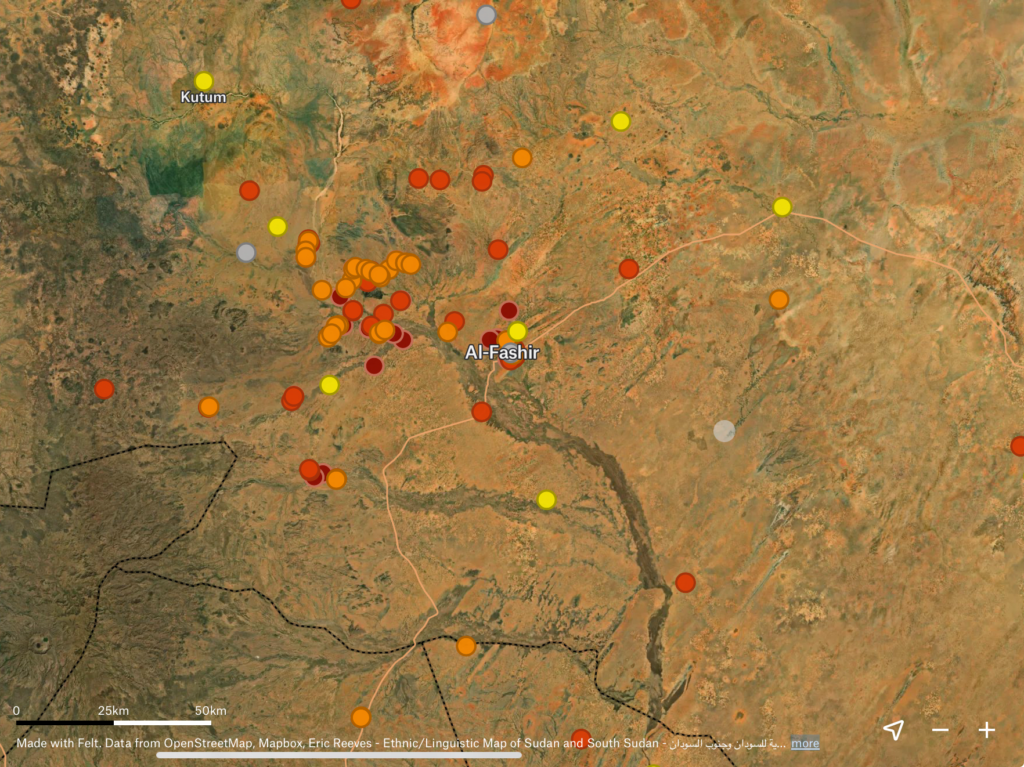Investigation: Satellite imagery shows over 50 villages repeatedly scorched in Darfur

Map of fires in and around El Fasher, North Darfur, since April 15, 2023 (Source: CIR / Sudan Witness)
Satellite imagery has revealed more than 235 fires in towns and villages in Sudan since the outbreak of war on April 15, 2023, according to the Centre for Information Resilience (CIR), a non-profit organisation which exposes human rights abuses and war crimes. Doctors working in El Fasher have warned of a lack of food and medical aid as El Fasher remains under siege.
In an interview with NBC News yesterday, Mark Snoeck, an open-source investigator, said: “When we see reports of fighting coinciding with clusters of fires, it indicates that fire may be being used as a weapon of war.”
The satellite imagery was collected in-part using heat-sensing satellites developed by NASA to monitor wildfires around the world, and analysed using information from open sources, including social media and maps.
Over 50 residential areas have been burned repeatedly, which may suggest that there is “intent” and forced displacement operations taking place, said Snoeck.
CIR found much of the violence was taking place in Darfur, reported NBC. The latest data shows the fires breaking out close to and in El Fasher. According to Snoeck, the fires around El Fasher coincided with the attacks by the RSF and its allies. CIR used a video clip posted on an RSF Telegram group, which was geolocated using satellite technology, to prove that a number of houses were burned in an area southeast of El Fasher. The clip was reportedly recorded between April 28 and 29. It shows armed men wearing RSF uniforms celebrating in front of the destruction.
Last week, fierce battles renewed in the capital of North Darfur as the Sudanese Armed Forces (SAF) and allied movements clashed with the Rapid Support Forces (RSF), which has been attempting to seize control for several months. The violence in El Fasher has become a near-daily occurrence, prompting residents to flee the confrontations and indiscriminate shelling that have killed and injured dozens.
Humanitarian situation
In an interview with Radio Dabanga, Jillian Burkhardt, an American obstetrician-gynecologist who completed a two-month stint at a hospital in El Fasher at the end of April working with Doctors Without Borders (MSF), said “there is no food or medicine inside the city of El Fasher.” All activities at the city’s southern hospital were suspended after the RSF ransacked the facility and stole an ambulance last week, according to reports by MSF.
Another doctor told Radio Dabanga that transporting humanitarian supplies to the city is very difficult because there are no functioning airports, and that trucks travelling from Chad loaded with ready-made meals take a month to reach the city. A convoy carrying aid from Chad for about 160 people reportedly crossed into Darfur this week. It is the third convoy to enter the country through El Tina border crossing during the past two months, and this assistance is directed to Central, East, and West Darfur.
International condemnation
In his press briefing on Sunday, following the UN Security Council’s adoption of Resolution No. 2736 on Thursday, which calls for an immediate cessation of fighting and a halt to the escalation in El Fasher and its environs, Farhan Haq, deputy spokesman for the Secretary-General, said that stopping the escalation may constitute the first step towards finding a sustainable solution to the conflict, warning that “the intensity of the conflict hinders the delivery of aid”.
UN Secretary-General António Guterres expressed his deep concern about the continued fighting in El Fasher, capital of North Darfur, and throughout Sudan yesterday, stressing the urgent need for a ceasefire to protect vital infrastructure and alleviate the suffering of civilians.
The key findings of a report published by the Yale School of Public Health’s Humanitarian Research Lab (Yale HRL) on April 29 showed visual confirmation via satellite imagery of thermal scarring in 11 villages in North Darfur. The report, which also cited news coverage by Radio Dabanga, confirmed the presence in the area of “probable RSF elements.”
While many analysts and observers say the RSF bears the greatest responsibility for targeting and killing ethnic minorities in Darfur, the army has not been immune from criticism. In a statement following a UN Security Council meeting on Sudan last month, US Ambassador Linda Thomas-Green accused the SAF of systematically obstructing life-saving aid and starving millions of innocent civilians caught in the middle of the war.











 and then
and then